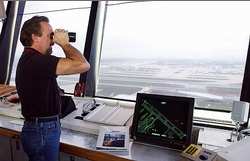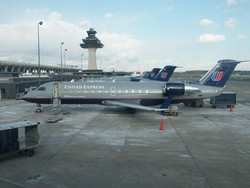Air Traffic Controllers Cite Fatigue, FAA Blames Shift
Change
 An error by air traffic
controllers that nearly caused two flights to collide near Chicago
last week are rare-staffing levels are adequate-according to
federal officials-while air traffic controllers complain of
fatigue and work conditions. An announcement from the Federal
Aviation Administration downplaying the incident came just before
the Thanksgiving holiday, after an acknowledgement by the White
House last week of concerns about US airspace congestion.
An error by air traffic
controllers that nearly caused two flights to collide near Chicago
last week are rare-staffing levels are adequate-according to
federal officials-while air traffic controllers complain of
fatigue and work conditions. An announcement from the Federal
Aviation Administration downplaying the incident came just before
the Thanksgiving holiday, after an acknowledgement by the White
House last week of concerns about US airspace congestion.
"These incidents are very, very rare," said Federal Aviation
Administration spokeswoman Elizabeth Isham Cory, responding to
questions about the near-collision between a United Express plane
and a Midwest Airlines plane over northern Indiana on Tuesday
night, according to the Associated Press. The November 13 incident
occurred at a time when the airplanes were being directed by the
Chicago Center, located in Aurora, Ill. A collision between the
flights at about 25,000 feet was avoided when a cockpit safety
device in one of the planes alerted pilots, according to the
FAA.
The flights were be followed by a controller who directed the
Midwest Airlines plane flying east from Milwaukee into the path of
the United Express jet heading west out of Greensboro, N.C. The
planes came as close as 1.3 miles apart horizontally and 600 feet
apart vertically, according to the FAA. While the FAA says there
was adequate staffing-and this day there was little traffic-air
traffic controllers argue fatigue due to six-day work weeks.
FAA air traffic directed nearly 50 million flights in 2005, the
last full year for which the agency provided statistics, and
committed about 1,500 errors - one for every 33,000 flights - she
said. A 2003 FAA study that found 78 percent of errors happen when
air traffic is light or average, with only 22 percent occurring
when a controller is handling a higher workload of 11 to 15
flights, according to Cory.
 "We're anticipating a
very safe holiday travel season," she said. "We are currently in
the safest period of aviation history, and we have every intention
of keeping it that way."
"We're anticipating a
very safe holiday travel season," she said. "We are currently in
the safest period of aviation history, and we have every intention
of keeping it that way."
Air traffic controllers in the Chicago region and elsewhere have
said they were weary and more error-prone after having to work
repeated six-day weeks.
"Any time you have people on six-day work weeks, it always
increases," he said.
"It's like a major-league pitcher - they can only throw so many
pitches. You reach a point of diminishing returns. It's
cumulative," said Joseph Bellino, president of the National Air
Traffic Controllers. Cory said the incident happened amid a shift
change during a busy time at the radar facility, which she said is
adequately staffed.
"Staffing is at the approved range for Chicago facilities," she
said.
Jeff Richards of the Chicago Center controllers association
disputed that and reiterated union assertions that the FAA was
ill-prepared for the high number of retirements of seasoned
controllers, resulting in a shortage. Richards said three
controllers a day are retiring nationally and three per month
locally. As a result of the stretched staffing, he said, the
Chicago facility has had three errors since October 1, after having
only one all last year.
"These controllers are fatigued from working such long stints
and very few breaks compared to just three years ago," Richard told
the AP.
 Aero-News: Quote of the Day (12.07.25)
Aero-News: Quote of the Day (12.07.25) ANN's Daily Aero-Linx (12.07.25)
ANN's Daily Aero-Linx (12.07.25) NTSB Final Report: Lafferty Jack Sea Rey
NTSB Final Report: Lafferty Jack Sea Rey Classic Aero-TV: The B29 SuperFortress Doc - History in Flight
Classic Aero-TV: The B29 SuperFortress Doc - History in Flight Airborne 12.08.25: Samaritans Purse Hijack, FAA Med Relief, China Rocket Fail
Airborne 12.08.25: Samaritans Purse Hijack, FAA Med Relief, China Rocket Fail




